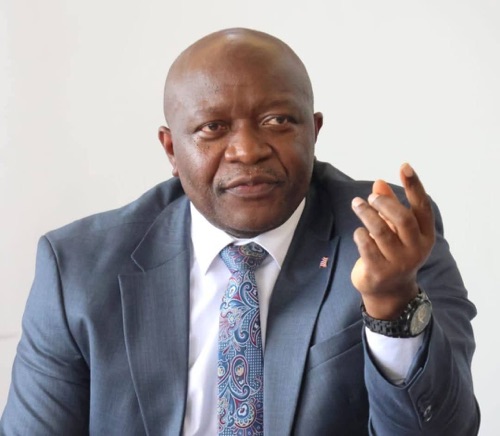Monrovia, Liberia — Finance and Development Planning Minister Augustine Kpehe Ngafuan on Thursday outlined a series of ongoing government efforts aimed at stabilizing Liberia’s economy, improving civil service efficiency, and managing the country’s growing debt burden. Speaking during an extended media engagement in Monrovia, Minister Ngafuan addressed issues ranging from payroll harmonization and domestic debt to the anticipated Millennium Challenge Corporation (MCC) compact and the administration’s priorities for 2025.
Civil Service Reform and Legacy Issues
Reflecting on his earlier role as Budget Director, Hon. Ngafuan highlighted past efforts to clean up the civil service payroll through measures such as direct deposit for teachers, a reform he said dramatically reduced fraud and eliminated long bank queues.
He recalled the early implementation of direct deposit in 2010, when some teachers—surprised by the accuracy of their pay for the first time—attempted to report what they thought were banking errors.
“I’m a stickler for pay increases. I believe we should pay people as a purpose to get the best out of them,” he said.
Ngafuan stressed that the current administration inherited “a challenging situation,” including roughly US$83 million in existing obligations, and called for public patience as the government works through these structural issues.
“We cannot do it in one day. That’s all we say. It is a goal—and harmonization break is not the end.”
MCC Compact: No Confirmed Amount Yet
Responding to widespread speculation about the size of the new MCC compact, Minister Ngafuan cautioned against spreading unofficial figures.
“We don’t have an amount from the MCC,” he stated.
He said the MCC Board is expected to reaffirm Liberia soon, after which both sides will determine funding priorities—especially in the energy sector, which the visiting MCC delegation emphasized.
While some Liberians have speculated that Liberia could receive between US$200 million and US$500 million, Hon. Ngafuan urged citizens to remain realistic.
“We have zero now, right? Zero versus 100 million—you’ll take 100 million.”
2025 Declared ‘Year of Engineers’
Ngafuan announced that the government will shift its focus to infrastructure development next year, with plans to hire an additional 200 engineers and increase their salaries.
“We’re bringing in an additional 200 engineers. We’re also going to increase the salary of engineers. This year is the year of engineers.”
He noted that last year’s emphasis was on healthcare workers and confirmed that volunteer teachers and traditional chiefs will also be added to the payroll this year.
Debt Burden and Court Judgments Pressuring the Budget
Providing a detailed look at Liberia’s fiscal position, Ngafuan said the country’s total debt stock is now around US$2.7 billion, while domestic debt alone stands at over US$1 billion—a figure he expects to rise by another US$95 million based on newly validated obligations.
He emphasized that commercial banks and the Central Bank of Liberia remain the largest holders of the domestic debt.
The Minister disclosed that US$11 million from the national budget is already committed to servicing a loan for the Gbarnga–Salayea Road project, and warned that numerous court judgments against the government are further straining public finances.
“Lawyers parade here every day. Everyone has won a case against the government,” he said, noting the difficulty of paying these obligations while maintaining fiscal stability.
He suggested that the Judiciary may need to review how such cases are handled to avoid unsustainable financial pressure on the state.
Security Sector: High Costs, Limited Disclosure
Hon. Ngafuan addressed concerns about alleged increases in security spending, dismissing claims that the administration is engaging in reckless budgeting.
He cited the 2023 audit showing that although US$24 million was budgeted for the National Security Agency that year, actual spending was US$84 million, and this year’s total allocation is lower—around US$22 million.
He stressed that many aspects of national security spending cannot be publicly detailed but underscored the importance of maintaining stability.
“Too much goes into keeping the country safe… Some of the things are not overtly stated.”
Roads, Agriculture, and Inflation
Minister Ngafuan reiterated that road construction remains central to Liberia’s development agenda due to its direct relationship with agriculture and rural market access. Improved road conditions, he said, have helped stabilize food prices, which in turn has contributed to lower inflation.
Liberia’s inflation rate currently “hovers around five percent,” he noted—low enough for the country to pass the MCC inflation indicator.
“Food price is a major component of the basket in inflation calculation… The more we put in roads, it appears that we’re doing it for roads alone. No. We’re doing it for agriculture and all others.”
Over 100 New Schools Approved
The Minister confirmed that the House of Representatives has approved financing for the construction of more than 100 new schools across the country, part of a broader push to expand educational access and improve human capital.
“As the Economy Grows, We’ll Solve These Problems”
Despite the economic challenges facing the country, Minister Ngafuan expressed confidence in Liberia’s fiscal trajectory and called on citizens to remain patient as reforms take hold.
“As the economy grows, we’ll solve this problem. But we cannot do it in one day.”



